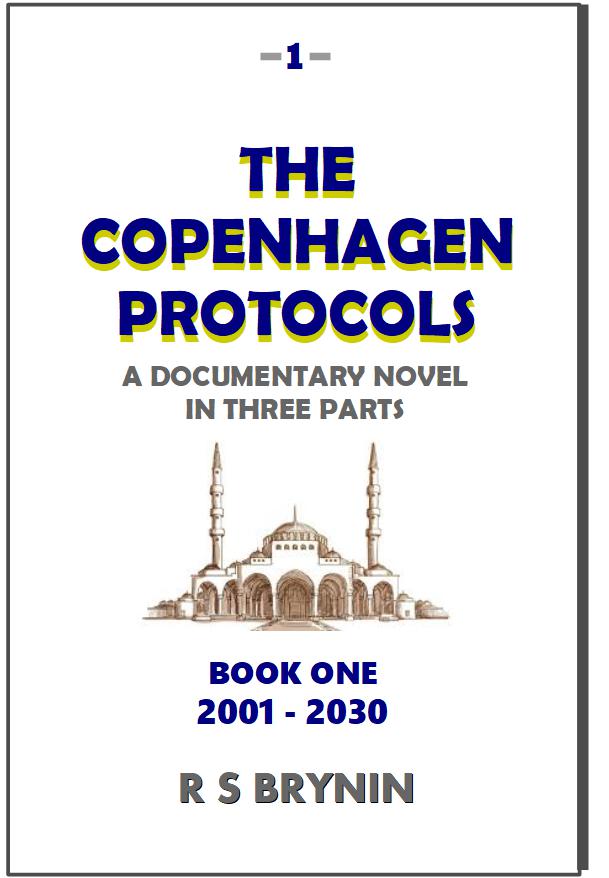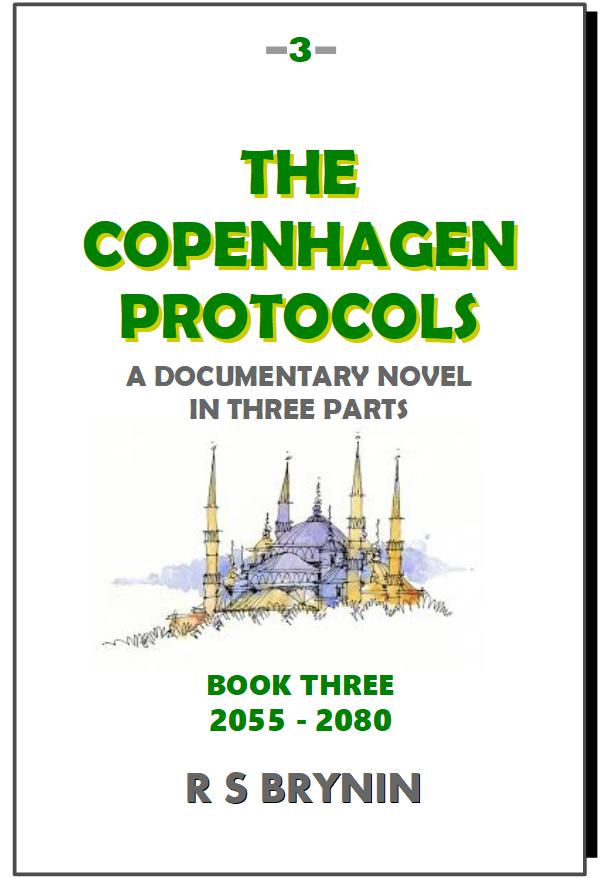
This three-part documentary novel is a fictional exploration of Islam’s colonial strategy and its bid for global domination.
It is set in Denmark, Israel, the United Kingdom and the United States, and takes place between 2001 and 2080.
Although by the end of Book Three Islam is finally defeated, the trilogy is a stark warning of how close the West might come to Muslim domination.
All three books are available individually on Amazon as a paperback or ebook.

AN EXTRACT FROM BOOK ONE
Aviva had transliterated the title, Ummat al-Islamiyah, and typed in brackets the closest translation in English, The Islamic Nation. The subtitle she translated as Protocol for Global Demographic Jihad. The introductory paragraphs summarised the need to defend Islam with the only weapon that was available, the Muslim people. Since the fall of the Caliphate the Islamic world had suffered at the hands of the infidels, who mocked the faith, and killed its adherents, with impunity. Every attempt to defeat them had come to nothing, but now Allah had placed in their hands the means to win this war once and for all. The one thing Muslims had learned since the creation of the Zionist state of Israel was patience. Israel would be overwhelmed with its own Muslim population, which was growing faster than the Jewish one. The hope was that the five million Palestinian refugees would one day flood the country and make it Muslim again, but if that was not the will of Allah then it would just take longer, and they would have to be patient.
In every country where there was a large Muslim community, that community was growing faster that the indigenous one. If it took a hundred years, or even a thousand, there was no country that could avoid having a Muslim majority eventually, even the United States of America. Britain and other European countries were showing the way, with large-scale immigration, big families, and conversions. And the key to conversions, the document stated, was proselytising. It was the duty of every Muslim to convert at least one person in their lifetime. After the Hajj, this was the most important thing they could do. For a man to marry a Muslim woman and have Muslim children, was good, but taking a non-Muslim woman who would convert in order to marry was better. If that woman married a Christian, she would have Christian children, so bringing her to Islam meant Muslim children instead of Christian ones.
……..
If that shocked Alix, the next bit left her speechless. Having married and produced a large Muslim family, the document continued, the man should feel completely free to divorce his wife and go through the process again with another Christian woman. Any man who produced two Muslim families would be especially blessed and worthy of a place in paradise.

AN EXTRACT FROM BOOK TWO
A secondary motion that did pass required all Muslim universities to provide a course on the history of the Middle East conflict, and one on Zionism. If anyone thought this was likely to provide balance they were soon disabused of that idea when they saw who was appointed to teach the course on the conflict at Chamberlain University. Professor Fatima Amini was the author of a number of academic papers written during her tenure at Al Quds University in Palestine. She was also known for her popular books, ‘War on Palestine: American Support for the Defeat of the Arabs’ and the somewhat esoteric ‘The Jewish War Against Islam, The Zionist Use of Magic to Defeat Palestine’. The professor appointed to teach the course on Zionism at Lindbergh University was Farrukh Azam, known for his best-selling book, ‘Zionism, the Genocidal Ideology that Stole Palestine’, and his popular series of radio lectures entitled ‘How Islam Defeated Zionism’, which were regularly repeated by the public broadcasters in Muslim states to large audiences.
It wasn’t long before people stopped talking about Muslim universities. For most Americans, they were part of a world that didn’t really impinge on them. It became accepted that American Muslims had a different educational system from the mainstream.
That, though was soon to change. If Americans thought the Michigan Group was all there was, they were quite wrong. They were simply the vanguard. Once it was established that there were Muslim universities in the United States, the stage was set for the next step in what The Copenhagen Protocols referred to as educational jihad.
……..
The inevitable consequence of requiring familiarity with the Quran for university entrance was that the high schools made it a mandatory part of their curriculum, and while they nominally followed the Federal Government’s curriculum requirements increasingly they paid lip service to them and no more. School inspectors were by now all Muslim, as were most members of school boards, so they had every base covered. By now, entrance to high schools also required a recitation from the Quran, so parents who were not Muslim were pretty well obliged to sell up and move to a city where the education system was still American. The demographic spread of the entire country was shifting and re-adjusting, and it was education that was the catalyst for this change.

AN EXTRACT FROM BOOK THREE
‘Hello, is that Mrs Mourad?’
‘Yes, how can I help you?’
‘This is Special Agent Browning of the FBI, Ma’am.’
‘I see. Well, Agent Browning, how can I help you?’
‘Mrs Mourad, have you recently received a visitor, shall we say from another country?’
‘Yes I have. May I ask why the FBI are interested in my visitor, and indeed how you got my phone number?’
‘Well, Ma’am, we’re the FBI. It’s what we do.’
Jenny mentally shrugged her shoulders. It seemed reasonable. She didn’t know how much the authorities knew about the farm. They were doing nothing illegal, but even so, the fewer people who knew the better.
‘Mrs Mourad, my colleagues and I have been called in by the Oklahoma State Troopers. They stopped a vehicle on Interstate 44 for a traffic violation and are currently holding the occupants in a police station in a town called Fort Sill. They had reasonable suspicion that these men had crossed the border from the Islamic Republic, and since that is an FBI matter they called me and my colleague in.’
‘I see. No, actually, I don’t.’
‘Well Ma’am, I can’t go into too much detail just now, but I can tell you the Bureau has been monitoring crossings into the Confederacy for some time now. We are aware of a young Muslim woman whose name we don’t know crossing the border recently. She was picked up in a car owned by your son, Simon Mourad.’
‘I see.’ Now she did. ‘I can honestly tell you, Agent Browning, that yes, we have recently welcomed a young Muslim woman here, and she crossed recently specifically to come to our farm, which as I am quite sure you know is a sanctuary for Muslim women escaping from the Islamic Republic.’
‘Yes Mrs Mourad, we know all of that, and I want to reassure you we have absolutely no concerns there. Personally, I think you are doing a great job, but that’s just me personally, you understand. The FBI’s concern just now is these four men. We have reason to suspect they might be connected to your recent arrival. If our suspicions are correct, this could put you in danger.’
‘Agent Browning, may I make a suggestion?’
‘By all means go ahead Ma’am.’
‘Are these men clean shaven?’
It was Agent Browning’s turn to be puzzled.
‘Yes, I think so. I didn’t take much notice. Why?’
‘Well, let’s establish first of all if they are Muslim, and secondly if they are hiding that fact. I think you will agree that if they are, on both counts, there will be considerable justification for us being concerned.’
‘I see. But how do we find out?’
‘Will you try a little experiment for me?’
‘Sure. Why not?’
‘Do you have a flashlight?’
‘I can easily get hold of one.’
‘Please do so. Then go into their cell and turn off the lights. Shine the torch on their faces and report to me what you see.’
He was perplexed by this strange suggestion, but sufficiently intrigued to go along with it. He rang her back a minute later.
‘OK, I’m doing it. What am I looking for?’
‘Do you notice that their chins are whiter than the other parts of the face?’
‘Hang on, now you mention it, yes, you’re right. How the heck did you know? And anyway, what does it mean?’
‘It means two things. First that they have all recently shaved off beards. Their faces are more tanned than the chins which have been covered by hair.’
He couldn’t suppress a chuckle. ‘OK, so why?’
‘Because they are Muslims who want to hide the fact. Many non-Muslim men have a beard, but the chance of four men in a car all having shaved off a beard at the same time is, I think you will agree, pretty small. No, these men have a very good reason for hiding the fact that they are Muslims.’
…….
‘Agent Browning. Your men were following my guest. Normally I would worry about that because it would compromise her security, but I’m afraid what we have is a plant. The young woman we have here has been sent to us by a person or organisation that has become aware of our work here. Were those men armed?’
‘Yes, but they all had permits in the State of Arkansas. It is a criminal offence to have those weapons in Oklahoma, but …’
‘That is not my concern, Agent Browning. My concern is that someone in the Islamic Republic of America knows of our activity. Those men you have there were on their way here to kill us.’
